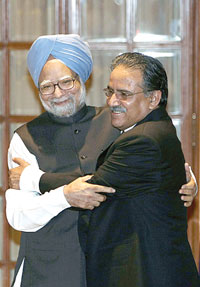 |
SD Muni's essay in Nepal in Transition: From People's War to Fragile Peace reveals the true colours of the Maoists and the degree to which party leaders surrendered to Indian interests so that their revolution would have Delhi's backing.
It is worth remembering that Muni's book emerged right after the Baidya faction accused the Maoist leadership of being heavily India-leaning and spilt from the mother party.
It is also no mere coincidence that decisions taken by both Maoist governments have served Indian interests. Before waging the war, Baburam Bhattarai submitted a 40-point demand to the government which included a proposed ban on Indian films. But after he became Prime Minister, Bhattarai signed BIPPA, a treaty guaranteeing protection of Indian investments in Nepal.
Muni's essay states that the Maoist leadership signed a written agreement with India to "never go against Indian interests" in return for Delhi's backing for their revolution.
Cautious that the rise of Maoist activity in Nepal would provide impetus to the Naxalite movement, India was quick to label the Nepali Maoists as terrorists even before the Nepal government. India's intelligence agencies were deeply suspicious of Nepal's Maoists, but it was through these agencies that the Maoists made contact with the Indian establishment.
These revelations must be understood as the Indian government's official expos� of the Maoists. The information presented in the essay concern high-level political decisions and thus cannot have been made public without the permission of the Indian government, the foreign ministry and intelligence agencies. Muni would not have been so insensitive to reveal state secrets so casually.
Having been a professor at Jawaharlal Nehru University for many years, Muni is an academician with keen insight on Nepali politics. He has studied the decade long conflict in great detail and the contexts, arguments and evidences presented in his book are not invalid.
Muni reveals he and other figures played a crucial role in establishing good relations between their government and the Nepali Maoists. Once India felt that it could use the Maoists as puppets to fulfil its whims, it guaranteed protection and provided refuge to Maoist leaders in Siliguri, Noida, Delhi and elsewhere.
The essay illustrates how foreign powers play Nepal's political parties against each other to accomplish their geo-political goals. For the Maoists to talk about nationality after this exposure is nothing short of hypocrisy.
It's time political parties as well as the general public engaged in serious discussions about the dangers and repercussions of these revelations on the independence, self-esteem and future of Nepal and Nepalis.


